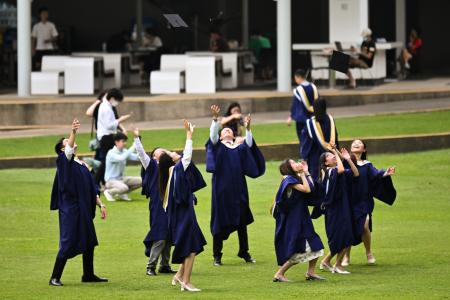Efforts under way to narrow pay gap between graduates from different institutions: Tan See Leng
Government agencies are working together on initiatives to narrow the pay gap between graduates from various institutions so that social cohesion is not impacted, Manpower Minister Tan See Leng said in Parliament on Tuesday.
A key way to do this is to ensure there are good job opportunities for polytechnic and Institute of Technical Education (ITE) graduates, he said in a reply to Dr Wan Rizal Wan Zakariah (Jalan Besar GRC), who had asked how the Ministry of Manpower (MOM) will close the pay gap between graduates and how it will engage with employers.
The pay disparity between graduates of different institutions has been discussed recently, with Deputy Prime Minister Lawrence Wong saying in January that Singapore should do more to address this issue. Today, the median starting salary for university graduates is about twice that of ITE graduates and about 1½ times that of polytechnic graduates.
Dr Tan told the House on Tuesday that the Government tracks the outcomes of graduates through graduate employment surveys and the Comprehensive Labour Force Survey.
The Ministry of Education (MOE) is also working with the institutes of higher learning to pilot tracer surveys to track key trends on graduates’ employment status and wages five years after graduation, he added.
Various ministries, including MOM, MOE and the Ministry of Trade and Industry (MTI), have been working to tackle the issue, he said. Apart from ongoing efforts in partnership with companies, new initiatives are also in the works.
“First, we need to enable our ITE and polytechnic graduates to enter good quality, in-demand jobs so that they can enjoy good career prospects and sustained wage growth,” said Dr Tan.
ITE and polytechnics regularly review their curricula and work closely with employers and sector agencies to provide internships to students, he said.
MOE is also scaling up work-study programmes where fresh polytechnic and ITE graduates are placed in jobs where they deepen skills related to their discipline of study.
Dr Tan said more than 95 per cent of graduates were employed six months after the completion of the work-study programmes. Based on MOE’s latest findings, median salaries have increased compared with what graduates received at the start of the programme.
As jobs evolve, ITE and polytechnic graduates need support to continuously upskill and progress in their careers, said Dr Tan.
The National Centre of Excellence for Workplace Learning helps companies to strengthen their workplace learning capabilities, so that their workers can upskill on the job. Graduates can also opt for upgrading through modular courses or part-time full qualifications at the institutes of higher learning while working.
Workers could also move to new careers as interests change and opportunities emerge in the economy, said Dr Tan. More than 12,000 polytechnic and ITE graduates have benefitted from career conversion programmes by Workforce Singapore in the last five years and moved into new jobs in sectors including air transport and financial services.
Employers must also consider graduates fairly for job and promotion opportunities, instead of pigeonholing them unfairly based on starting qualifications, said Dr Tan.
“Success will require buy-in from everyone in society to do our part to recognise, to value one another, and embrace a broader definition of meritocracy.
Get The New Paper on your phone with the free TNP app. Download from the Apple App Store or Google Play Store now



